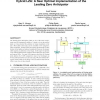Free Online Productivity Tools
i2Speak
i2Symbol
i2OCR
iTex2Img
iWeb2Print
iWeb2Shot
i2Type
iPdf2Split
iPdf2Merge
i2Bopomofo
i2Arabic
i2Style
i2Image
i2PDF
iLatex2Rtf
Sci2ools
92
Voted
ASPDAC
2009
ACM
2009
ACM
Hybrid LZA: a near optimal implementation of the leading zero anticipator
The Leading Zero Anticipator (LZA) is one of the main components used in floating point addition. It tends to be on the critical path, so it has attracted the attention of many researchers in the past. Most LZAs used today can be classified in two categories: exact and inexact. Inexact LZAs are normally preferred due to their shorter critical paths and reduced complexity; however, the inexact LZA requires an additional correct stage. In this paper we present a new LZA architecture that combines ideas taken from prior exact and inexact LZAs. Our new LZA improves the delay of floating point addition by 7–10% compared to state of art techniques as well as reduces hardware area in most cases. We also establish theoretical lower bounds on the delay of an LZA and we show that our LZA is very close to these bounds.
| Added | 28 May 2010 |
| Updated | 28 May 2010 |
| Type | Conference |
| Year | 2009 |
| Where | ASPDAC |
| Authors | Amit Verma, Ajay K. Verma, Philip Brisk, Paolo Ienne |
Comments (0)

